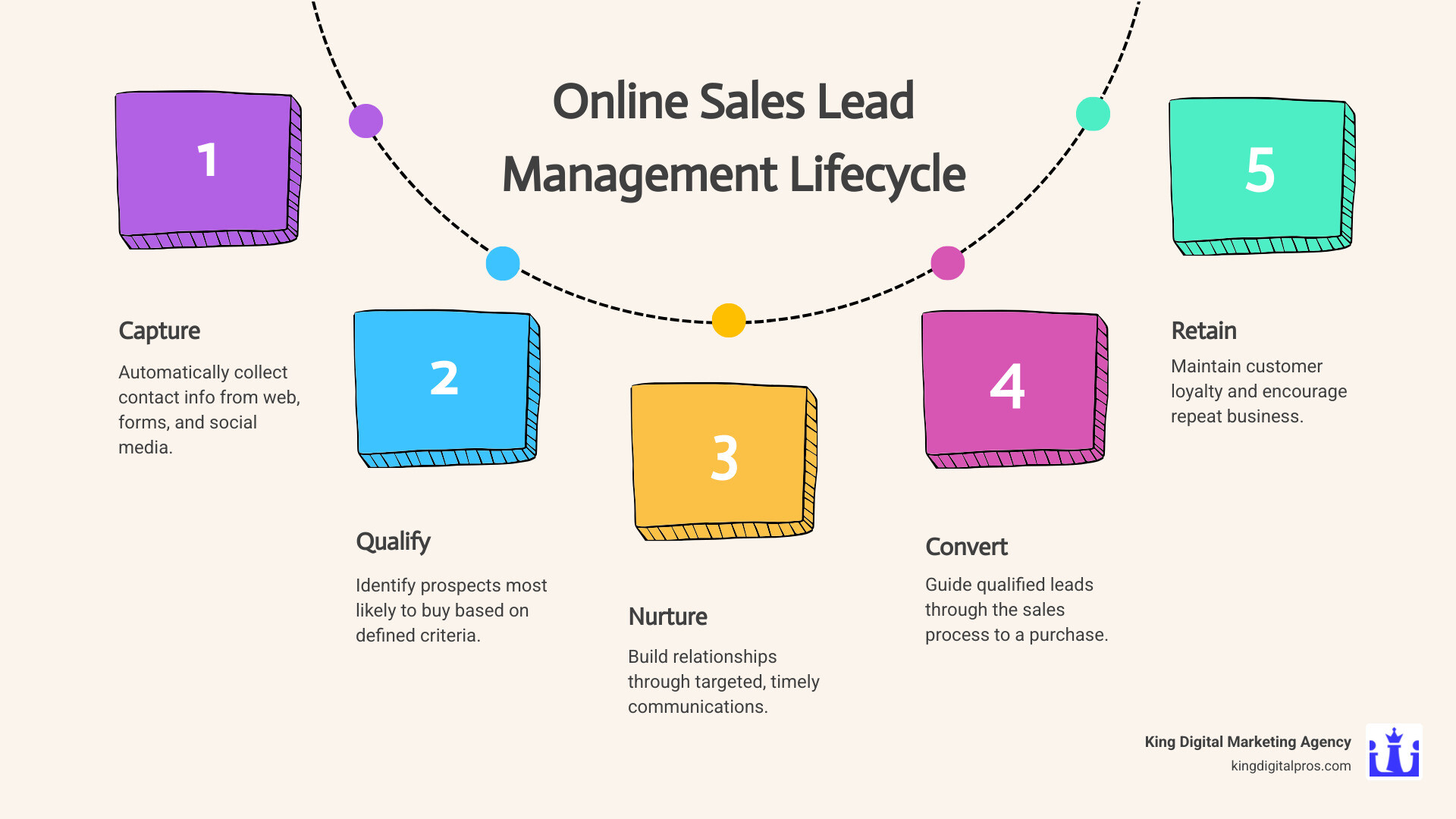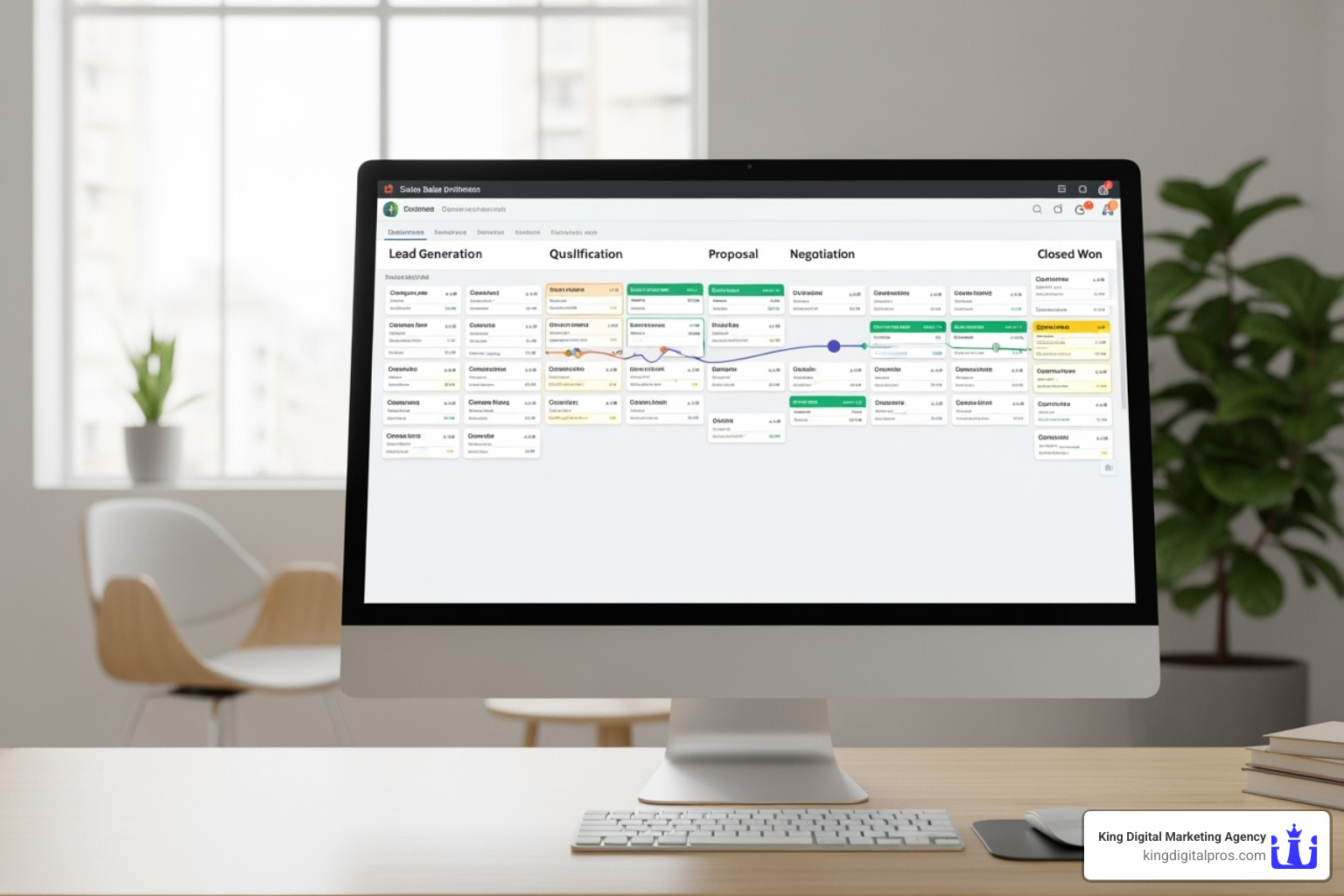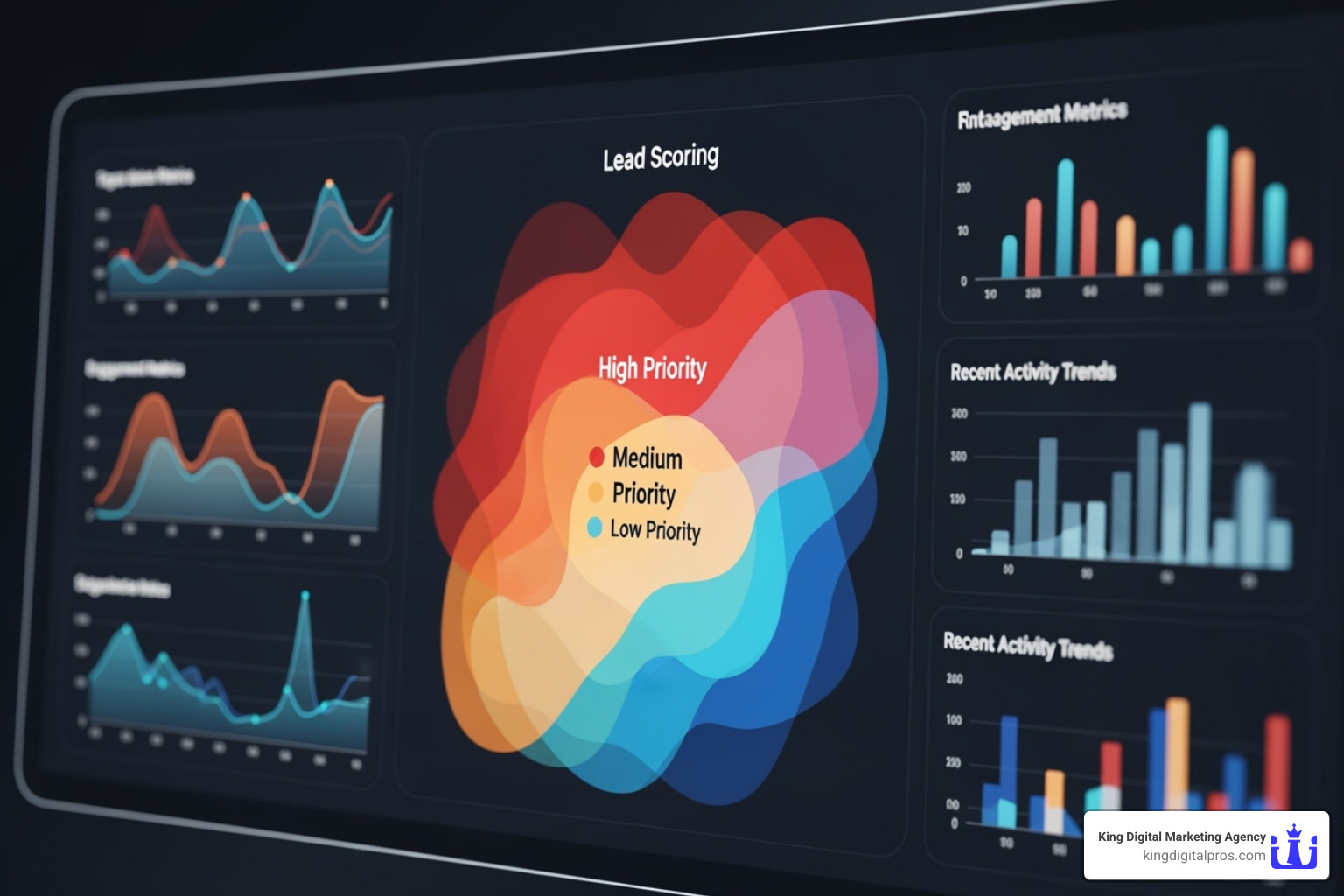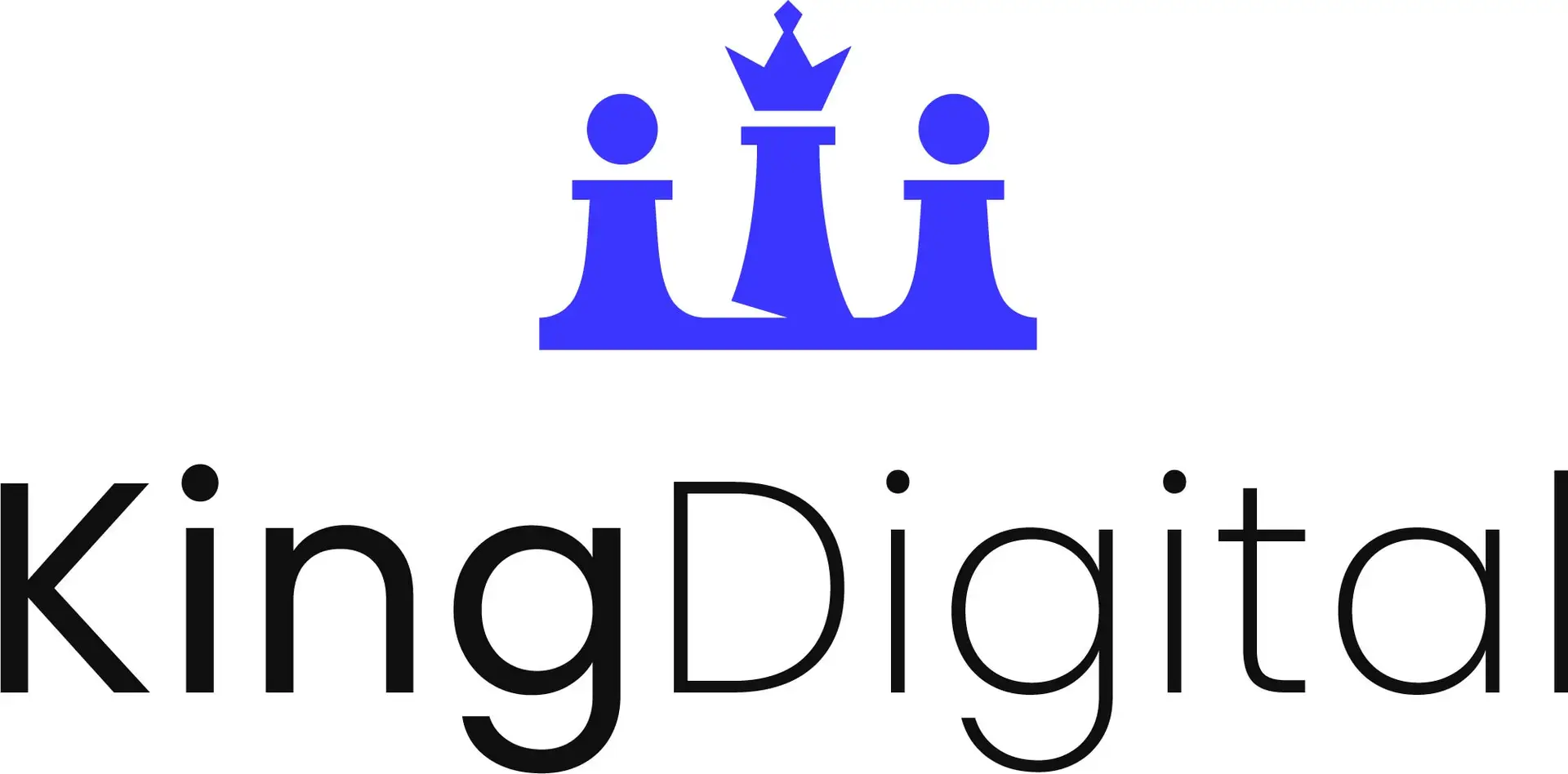Why Managing Online Sales Leads Feels Like Herding Cats
Online sales lead management is the process of capturing, organizing, and nurturing potential customers from initial contact to conversion. It involves several key steps:
- Lead Capture: Collecting contact info from websites, forms, and social media.
- Lead Qualification: Identifying prospects most likely to buy.
- Lead Nurturing: Building relationships with targeted communications.
- Lead Scoring: Ranking prospects based on engagement.
- Pipeline Tracking: Monitoring each lead’s progress.
Managing online leads without a system feels like herding cats. They pour in from your website, social media, and ads, each with unique needs. Without proper online sales lead management, opportunities slip through the cracks, follow-ups are forgotten, and hot prospects go cold. This chaos costs you real money.
Lead management software is the solution. It transforms the flood of inquiries into an organized, automated system that captures every lead and guides them toward a purchase. The power of this personalized approach is significant. Research from McKinsey shows that when customers feel understood, the likelihood they’ll make a purchase increases by 40%.
I’m Bernadette King, and I’ve seen how the right online sales lead management system can turn a struggling sales process into a revenue-generating machine. My experience building digital marketing strategies has shown that how well you manage leads often determines whether your business thrives or struggles.

What is Lead Management Software and Why Your Business Needs It
Think of online sales lead management software as a digital sales assistant that never sleeps. It organizes and tracks potential customers through your sales funnel, ensuring no opportunity is missed.
At its core, this software centralizes all lead data and interactions. This allows your sales team to engage with the right people at the right time, armed with the full context of every conversation. While often part of a larger Customer Relationship Management (CRM) system, lead management software has a more focused mission: turning an initial inquiry into a qualified, sales-ready prospect. A CRM manages the entire customer lifecycle, whereas lead management specializes in the crucial early stages.

In today’s market, neglecting leads means leaving money on the table. Online sales lead management software streamlines your process and delivers clear benefits:
- Improved Conversion Rates: Timely, personalized follow-ups boost your digital marketing conversion rate.
- Clear Pipeline Visibility: See where every lead stands and identify bottlenecks instantly.
- Increased Efficiency: Automation handles repetitive tasks, freeing your team to sell.
- Better Customer Experience: Personalized interactions build trust from the first touchpoint.
As research from McKinsey confirms, personalization can increase purchase likelihood by 40%. Strategic lead management is about nurturing inquiries into loyal customers.
Core Features to Look for in Online Sales Lead Management Software
Choosing the right software means knowing which features deliver the most impact. A robust platform should actively help your team sell more efficiently, centered around a visual sales pipeline that drives action. Your online sales lead management software should be the control center of your sales operation, handling the heavy lifting so your team can focus on closing deals.
Centralized Lead Capture and Contact Management
Your software must act as a central hub, automatically capturing leads from all channels, including web forms, live chat, social media, and your Google Business Profile. A unified inbox consolidates all communications from a single lead, giving your team full context for every conversation without digging through different apps.
When every touchpoint is automatically logged in one record, your team has instant access to a lead’s entire journey. This context makes every conversation more meaningful and relevant. For local businesses, tracking inquiries from Google Maps is crucial. A unified system ensures you can attract customers via Google Maps and manage those leads effectively.
Automation and Workflow Management
Automation is the engine of efficient lead management, handling repetitive tasks so your team can focus on selling. Key features include:
- Smart Lead Routing: Automatically assign leads based on location, product interest, or inquiry source. This ensures instant action and no delays.
- Drip Campaigns: These automated email sequences nurture prospects and keep your brand top-of-mind without manual effort.
- Task Automation: Create tasks automatically based on lead activity, like visiting a pricing page or downloading a case study. This ensures nothing falls through the cracks.
Lead Scoring and Prioritization
Not all leads are created equal. Lead scoring automatically ranks prospects based on their profile and engagement level (website visits, email opens). This allows your team to instantly identify the hottest leads who are most likely to convert, ensuring they prioritize their time effectively.

This data-driven prioritization prevents your team from wasting time on cold leads while hot prospects are waiting. As Harvard Business Review research highlights, the first five minutes of contact are critical for conversion. Lead scoring ensures that time is spent on your highest-potential prospects. If you need help setting up an effective system, our Lead Scoring Services can get you started.
Analytics and Reporting
What you can’t measure, you can’t improve. Good software provides clear dashboards and reports on key metrics like pipeline health, team performance, and conversion rates. This real-time insight helps you make data-driven decisions.
- Real-time dashboards give you an instant pulse on your sales operation.
- Performance tracking reveals patterns in marketing channels and sales activities.
- Conversion analysis shows the complete journey from first contact to closed deal, helping you identify bottlenecks.
This data is your roadmap for continuous improvement. For deeper insights, our Lead Tracking Services can help you turn data into revenue.
The Rise of AI in Sales Lead Management
Artificial Intelligence (AI) is revolutionizing how businesses handle leads. Many potential customers are lost simply because no one was available to respond instantly. AI solves this problem with tools that work 24/7.
AI-powered chatbots act as tireless sales assistants. They engage website visitors, qualify leads, and even book appointments, ensuring no lead goes unanswered. They can handle multiple conversations at once, keeping potential customers engaged.

Speed is critical. According to Harvard Business Review, the first five minutes after a lead shows interest are make-or-break. While your team is busy, AI responds instantly, dramatically increasing your chances of capturing their attention before they move to a competitor.
AI’s role in online sales lead management extends beyond quick responses. It also offers:
- Lead Pre-qualification: AI asks qualifying questions to determine interest, so leads are warmed up before they reach your sales team.
- Predictive Lead Scoring: By analyzing vast amounts of data, AI predicts which leads are most likely to convert, helping your team prioritize effectively.
- Hyper-Personalization: AI enables personalized communication at scale, tailoring messages based on individual behavior and preferences.
This technology doesn’t replace your sales team; it gives them superpowers to work more efficiently and close more deals.
How to Choose the Right Platform for Your Business
Selecting the right software depends on your unique business context. Consider your company’s size, sales process, budget, and existing technology to find the perfect fit.
Assessing Your Business Size and Needs
A small business doesn’t need the same firepower as a large enterprise. The key is finding software that matches your current reality while leaving room to grow.
- Small businesses often need affordable, intuitive tools that are easy to set up. They should cover the basics like lead capture, contact management, and simple integrations. For our Digital Marketing Agency for Small Businesses clients, a simple solution can be transformative.
- Enterprise organizations require highly customizable, scalable solutions to handle high lead volumes and complex sales cycles. They need advanced analytics, granular user permissions, and robust reporting.
| Feature/Consideration | Small Business Needs (SMBs) | Enterprise Needs |
|---|---|---|
| Budget | Affordable, free tiers available | Higher budget, complex pricing |
| Ease of Use | Intuitive, quick setup, minimal training | Requires training, but powerful features |
| Scalability | Grows with the business, simple upgrades | Highly scalable, supports large teams and data volumes |
| Customization | Basic customization, pre-built templates | Extensive customization, API access |
| Features | Core lead capture, basic CRM, email integration | Advanced automation, AI, complex reporting, multiple integrations |
| Support | Self-service, community forums, basic support | Dedicated account managers, 24/7 priority support |
| Integrations | Common apps (email, calendar) | Wide range of third-party apps, custom integrations |
Find software that matches your current needs but offers a clear upgrade path. Assess your monthly lead volume, sales process complexity, and number of users.
The Importance of Integration for effective online sales lead management
Your online sales lead management software shouldn’t be an island. It must connect with the tools you already use, like your email platform, calendar, and accounting software, to avoid manual data entry and errors.
Crucial integrations include email marketing (to add leads to nurture sequences) and calendars (for direct appointment booking). Look for platforms with pre-built integrations or a robust API for custom connections. This unified approach ensures better data accuracy, faster response times, and a complete view of the customer journey.
Evaluating Usability and Team Adoption for online sales lead management
The best software is worthless if your team won’t use it. Prioritize a clean, intuitive user experience. Your sales team is busy and needs a tool that simplifies their workflow, not complicates it.
Involve your team in the selection process. Let them test options through free trials and demos to ensure their buy-in. Pay attention to how quickly they adapt. Also, ensure the platform has a solid mobile app for managing leads on the go. The best software is the one your team uses consistently.
Frequently Asked Questions about Online Sales Lead Management
What’s the difference between lead management and pipeline management?
Though often confused, these terms refer to different stages. Lead management is the early phase of capturing, qualifying, and nurturing new leads to see if they are a good fit. It answers the question, “Should we pursue this person?”
Pipeline management begins after a lead is qualified and becomes a prospect. It involves tracking that prospect through defined sales stages toward a closed deal. It answers the question, “How do we close this deal?” Many modern platforms handle both seamlessly.
How much does lead management software cost?
Pricing is diverse. Many providers offer free-tier plans with basic features, which are perfect for new businesses. As you grow, most platforms use a per-user, per-month model. Costs increase with more users, contacts, and advanced features.
Paid plans can start around $10-25 per user per month, while enterprise solutions cost more. The key is to match your investment to your needs, ensuring you have the features that will boost your conversion rates without overpaying.
How does lead management improve conversion rates?
Online sales lead management systems improve conversion rates by creating a structured process that prevents leads from being mishandled. Here’s how:
- Prevents Lost Leads: It captures every inquiry and automates follow-up reminders, so no opportunity falls through the cracks.
- Increases Response Speed: Instant alerts and automated responses engage leads while they are in buying mode, before they move to a competitor.
- Enables Personalization: You can tailor communication based on a lead’s interests and behavior, which builds trust and increases the likelihood of a sale.
- Prioritizes Efforts: Lead scoring helps your team focus on the prospects most likely to buy, improving efficiency and close rates.
Conclusion
Choosing the right online sales lead management software is a strategic investment in your company’s growth. By centralizing data, automating tasks, and providing clear insights, these tools empower your team to stop spinning their wheels and start closing more deals.
The key is to find a platform that fits your unique business needs, team size, and budget. A good system solves common headaches like lost leads and manual follow-ups by creating a smooth, organized process. It should be a tool your team will actually use, that integrates with your existing software, and that can grow with your business.
Implementing a solid lead management system leads to faster response times, better customer relationships, and more sales. It’s not magic; it’s just smart technology combined with good organization.
If you’re overwhelmed by the options or unsure how to set up a system that drives results, you don’t have to do it alone. At King Digital Marketing Agency, we specialize in creating lead generation and tracking systems that convert. Our expert lead tracking services are designed to work seamlessly with your business, turning inquiries into your most valuable asset.

